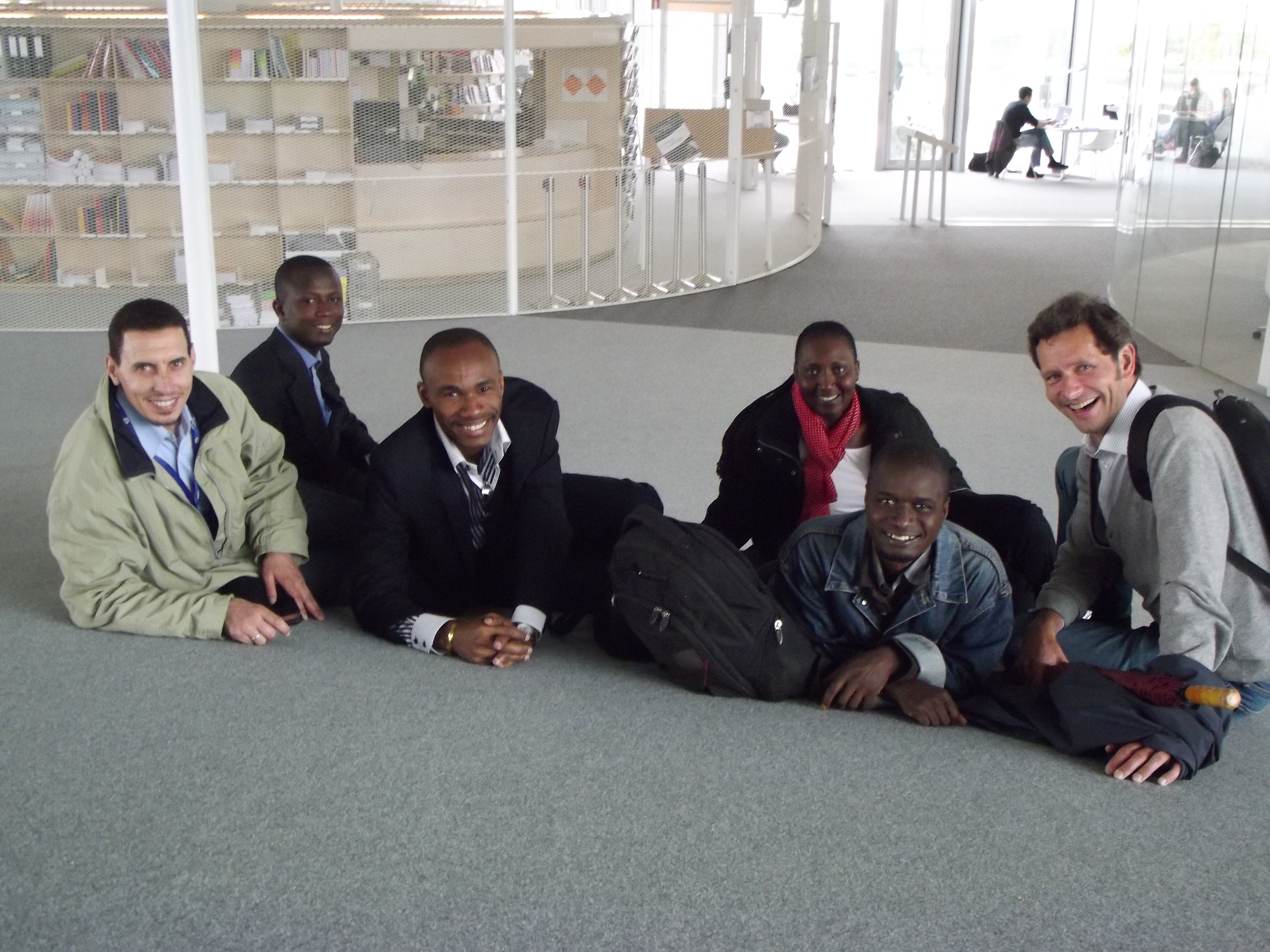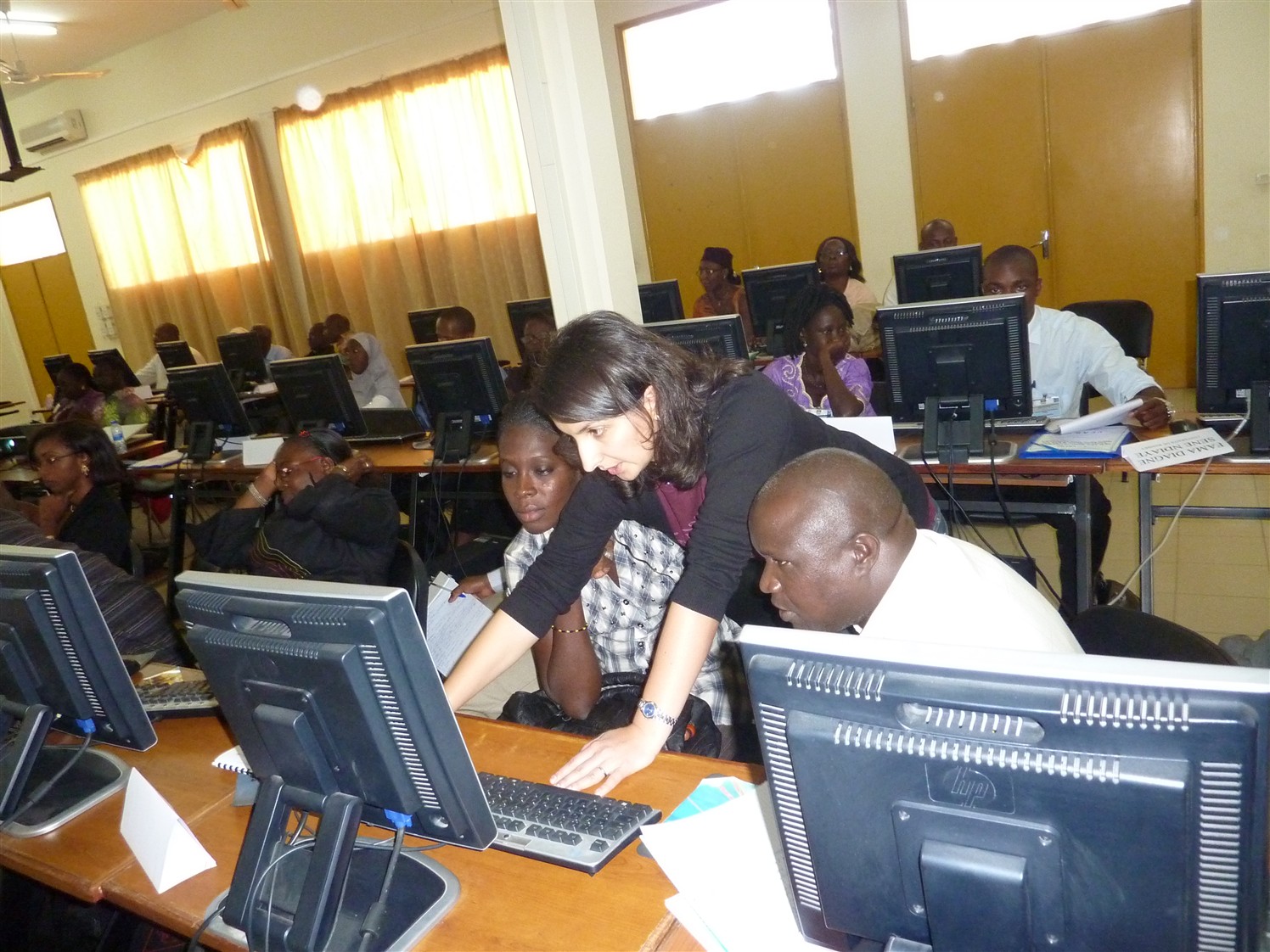2011 Sénégal
Third CERN-UNESCO School on Digital Libraries, held at Cheikh Anta Diop University, also known as the University of Dakar, Dakar, Senegal 21 - 25 November 2011
Tailor-made training for digital library software
Six librarians and IT engineers from Senegal, Mali, Burkina Faso, Ivory Coast and Morocco are currently spending several weeks at CERN as a follow-up to the 5-day CERN-UNESCO held in Dakar, Senegal, last year. During their stay, they are honing their mastery of CERN’s Invenio digital library management platform in order to put it to a variety of uses once they return home.

From left to right: Essaid Ait Allal (Morocco), Guillaume Nikiema (Burkina Faso), Eric Guedegbe (Senegal), Fama Diagne Sene Ndiaye (Senegal), Abdrahamane Anne (Mali) and Jens VIGEN (CERN). Cécile Coulibaly (Ivory Coast), who was also taking part in the training programme, is not in the picture.
“We plan to use Invenio to build a portal for all African university dissertations to make them accessible to the global academic community. We need a system which can harvest data from various existing platforms, then convert the bibliographic records and make them available at one central point,” explains Essaid Ait Allal, network and system administrator at the Moroccan Institute for Scientific and Technical Information. Guillaume Rewende Nikiema nods. He can identify with the need outlined by Essaid, working as he does for the African and Madagascan Council for Higher Education located in Burkina Faso, which also means bringing together library information from many different sources and platforms.
“Our interest is rather different,” says Fama Diagne Sene, chief librarian at the University of Bambey in Senegal. “All the original documents from the French colonial administration of what are now eight independent African states, dating from 1895 to 1958, are in Senegal. Unfortunately, the papers are slowly deteriorating due to heat, moisture and simply the passing of time. So by learning more about Invenio, we are building up the expertise to digitalise these unique historical records to preserve them and make them available to researchers not just in Africa but worldwide.”
These are just two examples of the kind of important and ambitious projects envisaged which need advanced digital library technology and training in how to use it. This is why this group of six librarians and IT specialists is intensifying its knowledge of Invenio at CERN. “It’s crucial to have these follow-up sessions, which are partly financed by UNESCO, like we did after the previous school too,” underlines Jens Vigen, head of CERN’s Scientific Information Services and organiser of the training. “This way, we can enable in-depth training for selected participants in so-called ‘multiplier’ positions. These are decision-makers and specialists in key institutions who can ‘multiply’ and pass on the knowledge gained at CERN as part of their day-to-day work.”
Published in : CERN Bulletin Issue No. 20-21/2012. The full article is accessible here.
Growing expertise in Africa: CERN-UNESCO's 3rd Digital Library School
The third in the series of CERN-UNESCO African Schools on Digital Libraries took place in Dakar, Senegal, in November last year. The School represents an important opportunity for CERN to contribute to a global exchange of knowledge, skills and culture.

Ludmila Marian assisting participants during a hands-on computer session.
After Rwanda and Morocco, this time it was Senegal's turn to host the Digital Library School, the third of its kind, held from 21 to 25 November 2011. Participants from seven African French-speaking countries met at the Université Cheikh Anta Diop in Dakar to learn about digital libraries and the importance of new technologies in the dissemination of knowledge by libraries. The School outlined the principles of digital information management and showcased the Invenio software, developed by CERN to manage digital libraries and freely available as Open Source software.
The series of Schools, which combine informative lectures with hands-on sessions where librarians and IT experts work together to install digital library software, is proving to be a success in several ways. Not only are participants putting what they've learnt into practice in their home institutions, but they are able to pass their expertise on to others. Two of the teaching staff in Dakar were graduates from previous Schools, meaning that the project creates an independent capacity for further training without outside intervention from CERN. True to the Chinese proverb “Give a man a fish and he’ll live for a day. Teach him how to fish and he’ll eat for the rest of his life,” real capacity building is taking place. To further enhance participants’ ability to disseminate their knowledge, a few selected students will be invited to come to CERN for several weeks to get more in-depth training.
A further benefit of the Schools is the networking possibilities. “We encourage the participants to build their own international networks so that they become more and more independent of support from CERN,” says Ludmila Marian from the Digital Library Services section of the IT Department. She is one of the four people from CERN who organised and taught at the School, led by the head of the CERN Library, Jens Vigen. Published in : CERN Bulletin Issue No. 06-07/2012. The full article is accessible here.
More photos are accessible here.